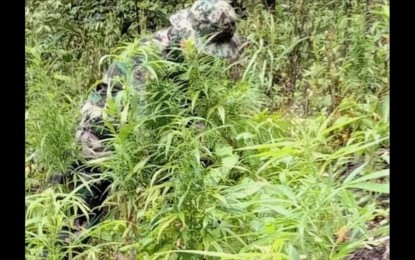
ERADICATION. Anti-drug operatives discover a marijuana plantation in Kalinga in this undated photo. Police Regional Office - Cordillera director, Brig. Gen. Mafelino Bazar, said on Wednesday (Jan. 25, 2023) that only 3 percent, or about 35 barangays, out of the 1,176 barangays in the region remains drug-affected while the rest are already drug-free. (PNA photo courtesy of PROCor-PIO)
BAGUIO CITY – The Police Regional Office - Cordillera (PROCor) has expressed confidence that the remaining barangays in the region affected by illegal drugs would soon be declared drug-free with more government agency intervention and collaboration.
“Marami tayong ginagawa and this time, hindi na lang law enforcement and nagtutulong-tulong para ma-address ang problema (We have a lot of effort and this time, it is not just the law enforcement agencies moving),” Brig. Gen. Mafelino Bazar, PROCor director, said in an interview late Wednesday afternoon.
Only 39 barangays, or 3.3 percent of the 1,176 barangays in the region, remain affected by illegal drugs, mostly in Benguet and Kalinga.
Bazar said the region's figures on drug-affected areas could be among the lowest in the country.
He, however, admitted that "cultivation areas" where marijuana plants thrive remain in parts of the region.
He said the Regional Law Enforcement Coordinating Council (RLECC), composed of several government agencies, is already addressing the problem, especially in Tinglayan in Kalinga.
“We have met with the local government units, together with the elders and the community leaders, about the problem and they asked for several programs and projects which they believe will address the cultivation problem in the area,” Bazar said.
He said community leaders have suggested ways to improve the economy in drug-affected areas, such as the development of a road network, livelihood activities for the residents, such as the propagation of orchids, and the establishment of a fish pen.
The dialogue with the community where the suggestions were raised was held sometime in November 2022.
“Sila mismo ang nag-isip ano ang puwedeng income-generating activity at hindi tayo, kasi importante na gusto nila ang gagawin nila (They were the ones who suggested the income-generating activity and not us because it is important that they want it),” Bazar said.
He noted that the RLECC, which is chaired by the Philippine National Police, has brought together different law enforcement groups to solve the marijuana cultivation issue in Mt. Chumanchil, which straddles several towns in Kalinga and the Mountain Province.
He said the departments of public works, trade, science and technology, and agriculture, as well as the Philippine Drug Enforcement Agency (PDEA), are collaborating on these efforts.
Julius Paderes, PDEA-Cordillera director, in a separate interview, said their agency has sent a communication to the Dangerous Drugs Board (DDB), which has funds of its own, to help in financing the projects, especially the road network requirement of the community.
“We are following it up with the DDB. We hope to get the funding needed for the projects in identified marijuana cultivation areas and be able to discourage the residents from pursuing illegal drug activity of some residents,” Paderes said.
He said the difficulty of transporting agricultural products due to the absence of a road network has prompted some residents to continue planting marijuana, which gives a high value when sold in urban areas.
Anti-illegal drugs ops
Bazar said the intensified anti-illegal drugs campaign in the region has resulted in the arrest of 504 drug personalities while almost PHP1.14 billion worth of illegal drugs has so far been confiscated, uprooted, and burned during marijuana eradication operations.
Records of the PROCor showed that from Jan. 1 to Dec. 31 last year, at least 620 anti-illegal drugs operations ranging from buy-bust operations, marijuana eradication, police response, implementation of search warrants, service of warrants of arrest, checkpoints, to interdiction operations.
The records also showed that the continuous conduct of marijuana eradication operations in Ifugao, Mountain Province, Benguet, and Kalinga has led to the destruction of 4,004,024 pieces of fully-grown marijuana plants and 1,618,375.76 grams of dried marijuana plants. (PNA)
